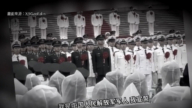【新唐人2012年12月28日讯】中国大陆70多位著名的学者和律师,最近敦促中共新领袖人实施温和的政治改革,包括党政分开,但却避免提及终结共产党一党专政。参与签名的学者表示,他们代表的是渐进改良派观点。但有学者指出,共产党无法达到民主自由等基本要求的原因是“共产党想要永远执政”。
这份改革共识倡议书由“北京大学法学院”教授张千帆起草,发表在他的博客上。倡议书呼吁共产党根据宪法治国、保护言论自由、鼓励民营企业、允许司法独立,也要求人民能不受共党干预,选举各级人民代表。
张千帆说,大陆亟需变革,才能更妥善处理面对的各种问题,包括社会不公平、政府权力滥用和贪污腐化。他说:“如果不改变,中国就有革命或混乱的风险。”
这份倡议书比较温和,要求共党领导层依照现行法律统治。
张千帆对美联社表示:这实际上很温和。希望政府能接受,开启政府与人民的对话、及公众间的对话。
而签署人之一,“深圳当代社会观察研究所”的创办人兼所长刘开明表示,很难知道中共新领导人是否能采纳这些建议。但是这些主张起码跟共产党声明的方向是一致的,比如说建立一个宪政国家和法治国家,努力实现民族的复兴。他说,这封信应该是基于现有体制所提出的一些建议。
但是,仍有很多知识份子都意识到,不放弃共产党一党专政,中国社会症结不可能根本消除。但是这封信并未触及这一议题。
深圳当代社会观察研究所所长刘开明:“因为从我们来说,首先我们都是生活在大陆的人。我们也都知道,在目前的现在体制里面,要轻易的呼吁结束一党专政,那么显然是短期内是不现实的。我们期待在现有的体制里面,能够达到他所承诺的这些民主自由人权。但是我们也强调,真正的应该是实现孙中山在一百年前倡导的民主自由人权宪政。”
“南方报业”高级编辑鄢烈山:“我们是主张渐进改良的改革的。各有各的表达。他当然有他的观点,他可以不签署。我们只能代表我们自己。”
时政评论专家文昭在论述“中国政治体制改革的路线图”时曾经提出,有许多中国人对急风骤雨式的社会变革充满了恐惧,希望走一条渐进式的变革之路。他认为,这就需要共产党从司法、宣传等领域全面撤出,向民众“让权”,否则完全不可能触及当前矛盾的实质。所以所谓“渐进式政治改革”,估计最终又会落到让民众耐心等待“从量变到质变”的说辞中去。
而倡议书也提出了保障言论自由,司法独立等要求。但是有学者指出,共产党不可能做到这些基本要求的原因是,共产党想要永远执政。放开权力就等于让共产党失去权力。共产党不可能答应,正所谓与虎谋皮。
刘开明:“我很难回答这个问题。但是共产党声称没有自己一党的利益,声称他的执政是为了人民,立党为公,执政为民,应该说当人民有这个要求的时候,共产党应该顺应人民的要求,因为他声称没有自己的利益。”
资深媒体人李大同对《美国之音》表示,说到底,中国的政治体制改革就是要“分权”。就是共产党囊括社会所有权力的现象再也不能继续延续下去,必须分权,向社会分权,要向议会分权,要向法律分权。
李大同提到,共产党向法律分权就是还司法的独立性,彻底扭转目前“法院要接受党的绝对领导”这样的封建专制意识。李大同认为,现在中国政改的阻力在于中共高层的第一考虑是“共产党能否永远执政”,但现实是“没有永远的执政党”。
采访编辑/秦雪 后制/肖颜
Political Reform Proposed by Tens of Chinese Scholars
Recently, more than 70 mainland well-known scholars and
lawyers urged the new CCP’ (Chinese Communist Party) leader to pursue a moderate political reform.
This included the separation of CCP from the government.
Nevertheless, the proposal avoids referring
to the ending of the one-party dictatorship.
Scholars who signed the proposal said,
they represent the progressive reformists.
However, some scholars point out, the reason for CCP’s
inability to meet the basic requirements for democracy and freedom is the fact that ‘CCP wants to govern forever.’
This reform proposal is drafted by Professor Zhang Qianfan
from Peking University’ Law School and was published on his microblog.
The proposal called on the CCP to govern the state according
to the Constitution, to protect the freedom of speech,
to encourage the private enterprises,
to allow judiciary independence,
and for the CCP to not interfere with people during elections
of their representatives at all levels.
Zhang Qianfan said, the mainland is of urgent need
to change in order to better deal with the variety of problems.
These include, the social injustice,
abuse of government power, and corruption.
He said, ‘Without a change, there would be a risk
of revolution or disorder in China.’
This proposal is relatively moderate in its request to CCP’
leadership to govern according to the existing laws.
Zhang Qianfan told the Associated Press:
“This is actually very moderate.
I hope the government can accept it and open up
a public dialogue between the government and the people.”
One of the signatories is Liu Kaiming, founder and director
of Shenzhen Contemporary Society Institute.
Liu said that it is hard to know whether the new CCP’
leadership will consider these suggestions.
But these proposals are at least in the same direction
as the CCP claimed to go.
For example, to establish a constitutional state and country
ruled by the law, to put efforts towards national rejuvenation.
He said, the recommendations in this letter
are based on the existing system.
However, still many intellectuals realize that if the one-party
dictatorship is not ended, China’s problems can’t be solved.
However, in this current proposal
this issue is not mentioned.
Liu Kaiming: ‘From our perspective, since we live in
mainland China, we all know that under the current system, to call for the one-party dictatorship’ end is unrealistic now.
We expect under the current system CCP can work within
their promises for democracy, freedom and human rights.
But we also emphasize it should work toward constitutional
democracy, freedom and human rights, advocated by Sun Zhongshan one hundred years ago.’
Yan Lieshan (senior editor, Southern Newspaper): ‘We
advocate a progressive reform. Both have their expressions.
He of course has his opinions, he can refuse to sign.
We can only represent ourselves.’
Commentator Wen Zhao discussed about,
‘China’s roadmap of a political system reform.’
Wen mentioned that many Chinese are afraid of a sudden
social changes, and hope for a gradual change.
He believes that if CCP does not withdraw from the judicial,
propaganda and other fields, and ‘give the rights’ to people, it simply can’t reach to the roots of the conflicts.
Thus the so-called ‘progressive political reform’ will maybe
end up as an empty talk, leaving the people to patiently wait for changes ‘from quantitative to qualitative’ eventually.
The proposal also mentioned about protecting the freedom
of speech, independence of the judiciary, etc.
Yet, some scholars point out, the reason CCP cannot reach
these basic requirements is that CCP wants to govern forever.
Letting go of the power means to let the CCP lose power.
The CCP will not agree on that.
Liu Kaiming: ‘It is difficult for me to answer this question.
CCP claims that there is no one-party interests, and its ruling is for the people.
Establishing of the party is to serve the public,
governing is to serve the people.
So the CCP should follow people’s request when people
have such a request, since CCP claims it has no interests.’
Li Datong, senior media professional, said to VOA, that
in the end, China’s political reform means ‘decentralization.’
It means the CCP can no longer hold all the power; it has to
decentralize the power to the society, the parliament and the law system.
Li Datong mentioned, the decentralization of the power
to the law system is to return to judiciary independence,
to completely reverse the feudal autocratic mindset of
‘the court has to accept the party’s absolute leadership.’
Li believes that the CCP’ resistance to political reform
is its leadership’ first concern of ‘CCP can govern forever.’
However, Li pointed out that:
‘there is no such a party that can rule forever.’


























